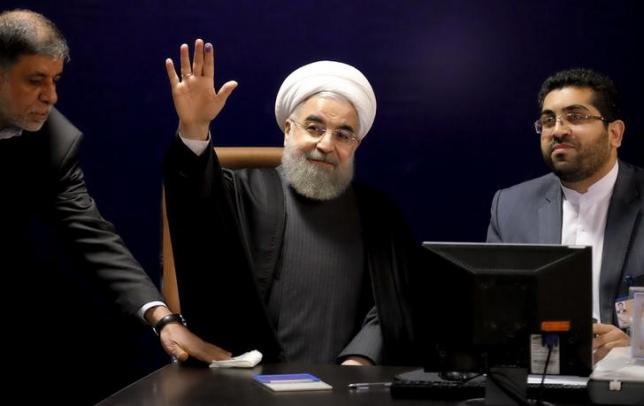Iran's pragmatic Rouhani cheers election wins, says gov't stronger
TEHRAN: Iranian President Hassan Rouhani won an emphatic vote of confidence and reformist partners secured surprise gains in parliament in early results from elections that could accelerate the Islamic Republic's emergence from years of isolation.
While gains by moderates and reformists in Friday's polls were most evident in the capital, Tehran, the sheer scale of the advances there suggests a legislature more friendly to the pragmatist Rouhani has emerged as a distinct possibility.
A loosening of control by the anti-Western hardliners who currently dominate the 290-seat parliament could strengthen his hand to open Iran further to foreign trade and investment following last year's breakthrough nuclear deal.
A reformist-backed list of candidates aligned with Rouhani was on course to win all 30 parliamentary seats in Tehran, initial results released on Sunday showed. Top conservative candidate Gholamali Haddad Adel was set to lose his seat.
"The people showed their power once again and gave more credibility and strength to their elected government," Rouhani said, adding he would work with anyone who won election to build a future for the industrialised, oil-exporting country.
The polls were seen by analysts as a potential turning point for Iran, where nearly 60 percent of its 80 million population is under 30 and eager to engage with the world following the lifting of most sanctions.
"Based on the votes that we have so far it looks like the principlists will lose the majority in the next Majlis (parliament) shy of 50 percent. The reformists gained 30 percent and independent candidates did better than before, gaining 20 percent," said Foad Izadi, an assistant professor at the Faculty of World Studies in Tehran University.
Principlists, otherwise known as hardliners, hold 65 percent of the outgoing parliament and the rest is divided between reformists and independents who traditionally support Rouhani.
Izadi said the reformists' strong lead was prompted by Rouhani's success in reaching a nuclear agreement between Iran and international powers, the removal of most of the punitive sanctions that had strangled the country's economy over the past decade and restoration of relations with the West.
"It is a sweeping victory for Tehran but for other cities it is not yet clear cut. It is beyond expectations," he added.
Etemad, a reformist newspaper whose managing-editor Elias Hazrati won a seat in Tehran, has chosen the first headline of “clean up in the parliament.”
"The next parliament will be like no other parliament in the history of Iran as no political faction will have the absolute say," the newspaper said on its front-page.
Millions crowded polling stations on Friday to vote for parliament and the Assembly of Experts, which selects the country's highest authority, the supreme leader. Both bodies have been in the hands of hardliners for years.
Supporters of Rouhani, who promoted the nuclear deal, were pitted against hardliners close to Supreme Leader Ayatollah Ali Khamenei, who are wary of detente with Western countries.
ACUMEN
Rouhani and key ally and former President Akbar Hashemi Rafsanjani were leading the race for the Assembly of Experts with most votes counted, and appeared to be sure of winning seats, early results released on Saturday showed.
Until now, the contest for this seat of clerical power was an unremarkable event, but not this time. Because of Khamenei’s health and age, 76, the new assembly members who serve eight-year terms are likely to choose his successor. The next leader could well be among those elected this week.
Rafsanjani is among the founders of the Islamic Republic and was its president from 1989-1997. Nearly always at the centre of Iran's intricate webs of power, the arch-fixer is famous for his pragmatism and political acumen.
Two prominent hardliners were on course to be elected with lesser scores in the experts assembly race: Ahmad Jannati was in 11th place and the assembly's current chairman, Mohammad Yazdi, was 15th. Arch-conservative Mohammad-Taghi Mesbah-Yazdi appeared unlikely to win a seat, according to partial results.
The results were initially announced as final in an official statement. A later statement said the results were partial and a final tally would be announced in due course.
INFLUENCE
A Reuters tally, based on official results published so far, suggested the pro-Rouhani camp and allied independents were leading in the parliamentary vote. Some moderate conservatives, including current speaker Ali Larijani, support Rouhani.
A breakdown of the results had independents on 44, reformists on 79, and hardliners on 106, the tally showed. A number of seats will be decided in run-offs in late April because no candidate won the required 25 percent of votes cast. Eight of the initial winners were women.
Analyst say the large number of independents may be significant as they could cooperate across ideological lines with Rouhani's government.
Whatever the outcome, Iran's political system places much power in the hands of the conservative Islamic establishment including the Guardian Council, which vets all laws passed by parliament.






